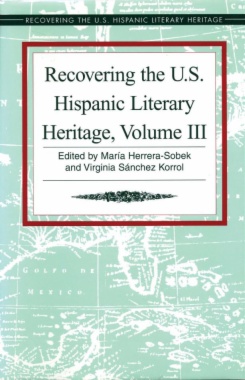"This third volume of academic essays addresses the broad topics of Rewriting the Present: Nineteenth-Century Historical Novels
- Cover
- Title page
- Copyright page
- Contents
- Introduction
- Part I. Rewriting the Present: Nineteenth-Century Historical Novels
- Es necesario Mirar Bien: Nineteenth-Century Letter Making and Novel Writing in the Life of María Amparo Ruiz de Burton. Amelia M. de la Luz Montes
- “How to Say”: Fashioning Narrative Windows
- “This Yankie Nation”: Negotiating Gender and Race in Washington
- “I Shall Write”: Experimenting in Genres, and Expanding the Literary Canon
- “Los Malos y Falsos Informes”: Fighting Marginalization
- Notes
- Works Cited
- Novelizing National Discourses: History, Romance, and Law in The Squatter and the Don. Jesse alemán
- Como dios manda: Political Messianism in Manuel C. de Baca’s Noches tenebrosas en el condado de San Miguel. Erlinda Gonzales-Berry
- The Gorras Blancas
- A Messiah for Stormy Seasons
- Will the Real Messiah Please Stand Up?
- Who Profits from Redemption?
- Fact, Fiction, or Self-Righteousness?
- Notes
- Breaking All The Rules: María Amparo Ruiz de Burton Writes a Civil War Novel. José F. Aranda, Jr
- Part II. Women’s Voices: The Construction of Ethnic Gender Identities
- Los textos narrativos y su importancia historiográfica: Las memorias de Leonor Villegas de Magnón. Martha Eva Rocha Islas
- Representing Mexico: María Cristina Mena’s Short Fiction in The Century Magazine, 1913-1916. Amy Doherty
- Confronting la Frontera, Identity and Gender: Poetry and Politics in La Crónica and El Demócrata Fronterizo. Louis Mendoza
- Ramirez’s Poetics and Praxis
- Conclusion
- Notes
- Works Cited
- Mediating the Desire of the Reader in Villegas de Magnón’s The Rebel. Andrea Tinnemeyer
- Genre Rupture
- Lily Long as the Ideal American Reader
- Notes
- Works Cited
- Framing the Female Voice: The Bancroft Narratives of Apolinaria Lorenzana, Angustias de la Guerra Ord, and Eulalia Perez. Virginia M. Bouvier
- Part III. Chroniclers, Ethnographers, and Historians
- New Approaches to Old Chroniclers: Contemporary Critical Theories and the Perez de Villagrá Epic. María Herrera-Sobek
- The Aztlán Myth
- Notes
- Works Cited
- Cantaron la victoria: Spanish Literary Tradition and the 1680 Pueblo Revolt. Barbara De Marco
- Los Comanches: Text, Performance, and Transculturation in an Eighteenth-Century New Mexican Folk Drama. Enrique R. Lamadrid
- Notes
- Works Cited
- Primary Sources
- Interviews
- Secondary Sources
- A Portrait of the Spanish Conquistador in La Florida del Inca. Shannon L. Moore-Ross ; José B. Fernández
- El exilio cubano del siglo XIX: La leyenda negra y la figura del indio. Marcella W. Salas
- Varela/Sellén: la construcción de una identidad y la formación de una conciencia nacional
- La leyenda negra y la figura del indio
- Jicoténcal/Hatuey: alegoría y desespañolización
- Notas
- Negating Cultures, Saving Cultures: Franciscan Ethnographic Writings in Seventeenth-Century la Florida. E. Thomson Shields, Jr
- The Nogales Dispute of 1791-92: Texts and Context. Charles A. Weeks
- Part IV. Identity and Affirmation: Contextualizing U. S. Hispanic Literature
- Before the Diaspora: Early Dominican Literature in the United States. Silvio Torres-Saillant
- I. Cultural Invisibility
- II. The Literary Productivity of the Diaspora
- III. The Case for a New Chronology
- IV. U. S.-Dominican Relations
- V. Nineteenth-Century Dominican Presence in the United States
- VI. The Twentieth Century: The Henríquez Ureña Family
- VII. Dominican Writers in New York through the 1950s
- VIII. Recovering Early U. S. Dominican Texts
- Note
- Works Cited
- The Recovery of Salomón de la Selva’s Tropical Town: Challenges and Outcomes
- The World of 1918
- A Biography
- Themes
- Formal Aspects of Tropical Town
- The Poetic Dialogue with Edna St. Vincent Millay
- The Poetic Dialogue with Rubén Darío
- Salomón de la Selva After Tropical Town
- The Literary Heritage of Tropical Town
- Notes
- Works Cited
- “A Man of Action”: Cirilo Villaverde as Trans- American Revolutionary Writer. Rodrigo Lazo
- I. “I Exchanged my Literary Tastes”
- II. An Attack on “Literary Vanity”
- III. Here and There: Trans-American Revolutionary Writers
- Works Cited
- Notes
- From Factory to Footlights: Original Spanish-language Cigar Workers’ Theatre in Ybor City and West Tampa, Florida. Kenya C. Dworkin y Mendez
- Introduction
- A Brief History
- The Plays
- Conclusion
- Notes
- Works Cited
- Looking Backward, Looking Forward: Jesús Colón’s Left Literary Legacy and the Adumbration of a Third-World Writing. Tim Libretti
- Jesús Colón: Relación entre crónica periodística, lenguaje y público. Edwin K. Padilla
- Part V. Using Historical, Archival, and Oral Sources
- Social Identity on the Hispanic Texas Frontier. Gerald E. Poyo
- Introduction
- New Spain’s Sistema de Castas
- Bexar’s Demographic Development
- Defining Español in Bexar
- The Workings of Calidad and Status in Bexar
- The Case of Nacogdoches
- Conclusion
- Notes
- Reading Early Neomexicano Newspapers: Yesterday and Today. Doris Meyer
- Recovering Neo Mexicano Biographical Narrative: Cuarenta años de legislador, the Biography of Casimiro Barela. A. Gabriel Meléndez
- Nineteenth-Century Mexicano Life-Narratives As Symbolic Biography
- From Boceto to Biographical Communitas
- Resurrected Meaning(s)
- The Barela Brand
- The Metaphor of the Empty Filing Cabinet: Recovering the Casimiro Barela Biography
- Works Consulted—Primary Sources
- Secondary Sources
- Notes
- En torno a Joaquín Murrieta: Historia y literatura. Luis Leal
- Varela’s Jicoténcal and the Historical Novel
- Introduction
- The Novel as Autobiography
- The Novel as History
- The Novel as Anthropology
- Meaning of the Novel
- Select Bibliography

